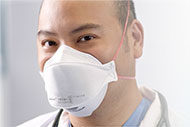CMS finalizes rule on accrediting organizations
Administrative // The Centers for Medicare & Medicaid Services (CMS) issued a final rule on oversight of CMS-approved accreditation programs. It amends the regulations for how national accrediting organizations (AOs) apply for and maintain their programs. The final rule adds a provision requiring AOs to provide documentation demonstrating the comparability of their processes and surveyor guidance to those required for state survey agencies (SAs). However, CMS states it must review survey procedure comparability under current regulations, and “it has been our practice to allow SAs and AOs flexibility in determining the size and composition of their survey teams and the duration of their surveys.”
CDC updates MERS guidance for professionals
Infection prevention // The Centers for Disease Control and Prevention (CDC) has updated its interim guidance for health care professionals for Middle East Respiratory Syndrome Coronavirus (MERS-CoV) infection. The guidance includes criteria regarding who should be evaluated for MERS-CoV. It also contains guidelines for the evaluation and management of close contacts, as well as reporting, laboratory testing and infection control.
ASHE posts brief on CMS equivalency process
Facilities // The American Society for Healthcare Engineering (ASHE ) recently posted an issue brief on its website concerning the Centers for Medicare & Medicaid Services’ (CMS) revamped process for equivalencies. According to the brief, ASHE members who submitted equivalencies without hardship assessments were receiving rejections. “CMS requires that any request for deviation from adopted codes should include an assessment of hardship that explains the need for the deviation, as well as assurance that overall patient safety will not be diminished by the equivalency,” ASHE states. “According to CMS, an unreasonable hardship could include factors such as costs, the extent and duration of disruptions of patient areas, the availability of financing and the remaining life span of the building.”
AHA comments on hazardous drug handling
Supply chain // The United States Pharmacopeia (USP) Convention should relegate its proposed general chapter on hazardous drug handling in health care to a “best practice” rather than an enforceable standard, the American Hospital Association (AHA) recently commented to the USP. “Our members rely on the USP to provide them with guidelines and other products that reflect evidence-based standards that help to ensure safe and effective pharmacy production and dispensing,” wrote Linda Fishman, AHA’s senior vice president of public policy analysis and development. “However, there is uncertainty regarding whether the proposed standards in this chapter fall within USP’s routine scope. Further, many of the proposals are supported by limited evidence.”
Joint Commission publishes EC compliance tips
Facilities // A recent edition of the Joint Commission Online newsletter provided tips for complying with Environment of Care standard EC.02.03.05 elements of performance 11–13, which involve testing and inspection requirements for fire pumps, standpipe systems and automatic fire-extinguishing systems in a kitchen, if such features exist within a health care facility. For more information, including what to expect during the survey, the Joint Commission urged readers to see the June 2015 issue of Joint Commission Perspectives.





